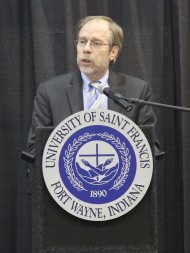February 23, 2016 // Uncategorized
Servus Omnium: The importance of servant leadership discussed as USF’s annual breakfast

Greg Erlandson, the former president and publisher of Our Sunday Visitor Publishing in Huntington, was the speaker for the Servus Omnium lecture on Feb. 9 at the University of Saint Francis.
By Madeline Richey
FORT WAYNE — Greg Erlandson, who recently retired after nearly 27 years with Our Sunday Visitor Publishing, serving 16 years as president and publisher, spoke at the fourth annual Servus Omnium lecture on Feb. 9. Erlandson, who won the Francis de Sales Award for “Outstanding Contributions to Catholic Journalism” last year, and was inducted into the Hall of Fame of the Association of Catholic Publishers this month, examined servant leadership in his lecture “The Servant of All: Reflections on the Paradox of Leadership.”
Approximately 250 people from Fort Wayne and the surrounding area gathered to hear Erlandson speak, meet with other community members and enjoy a Mardi Gras celebration. USF president Sister of St. Francis Sister M. Elise Kriss opened the event with a warm welcome, followed by a blessing from Bishop Kevin C. Rhoades for the breakfast buffet.
“No one is more miserable than a man who hates his job,” began Erlandson. Telling the story of his first job as a janitor, he compared it to the daily misery of the clown who painted faces and made animal balloons all while muttering angrily under his breath.
“Do something you love,” Erlandson advised. “Don’t waste your time — it makes you hateful and sad.”
The moral of the story, he explained, is not that a job makes a man, but rather that a man makes the job. Erlandson learned this lesson early in life and later applied it to his roles in leadership positions.
“I began to see leadership as a form of service and I began to reflect on my faith, and how it affected the way I did my job,” Erlandson said. He admitted that incorporating faith and service into a leadership role is not always easy. “I believe servant leadership is about conversion. The paradox is that we are called to serve and be a leader.”
In today’s world, where leaders are often seen simply as managers whose sole task is to oversee work being done, this is not always an easy task.
This paradox is not a new development, but something Erlandson believes dates back to Jesus’ vision of leadership that involved “the leader as the servant.”
“In our Church,” said Erlandson, “this message of service is enacted every Holy Thursday.” It is a message that Pope Francis has made great strides to act out in his daily interactions. Erlandson personally witnessed the Holy Father celebrating his birthday with the staff at the hotel where he lives, taking time to converse with and counsel one staff member’s mother who was fighting cancer. Pope Francis takes his cue for servant leadership from St. Francis of Assisi, who said, “Because I am the servant of all, (in Latin, ‘servus omnium’) I am obliged to serve all and to administer the fragrant words of my Lord to them.” This message is even more important when those Erlandson calls “Professional Christians” fall into the easy trap of thinking that work is enough. “We think we’ve done our part at the office 40 hours a week,” he warned, but in reality that is only a part of being a Christian leader, constantly being watched as an example to others.
“As a leader you are always being watched,” said Erlandson. Accordingly, a leader must lead not by words alone but also by action, being especially mindful of the way they treat others. “Because we sign someone’s paycheck does not mean we are better than them or more beloved in the eyes of God,” he said. Rather a leader has more responsibility to help that person reach their full potential, listening to their input, prompting those who are shy to contribute and giving clear instruction. At the same time, Erlandson said, “You can’t do everything by consensus.” The fruits of this labor are found in watching those under leadership develop their God-given talents, often becoming leaders in their own right.
The importance of being a servant leader has recently been thrust into the public eye by Pope Francis. In turn, his message has been taken up by Christian leaders each in their own way to further the message of leading by example and through service to others. Erlandson believes this ought to function best in the opposite way of traditional leadership: rather than a triangle with the leader at the top, it should be upside-down with the leader at the bottom, supporting his or her direct reports, and through them the staff they oversee, until it reaches the widest spread portion of the organization.
The best news. Delivered to your inbox.
Subscribe to our mailing list today.





